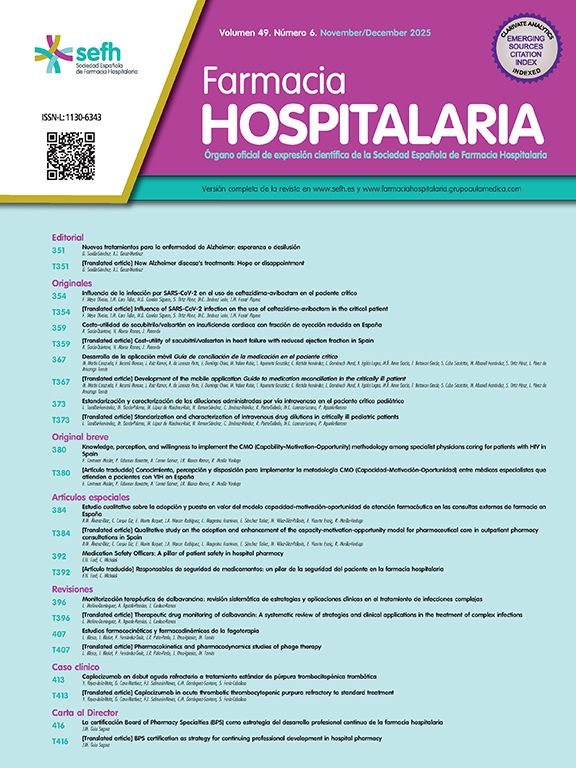Farmacia Hospitalaria (Farm Hosp) is the official publication of the Spanish Society of Hospital Pharmacists (SEFH), a professional and scientific organization that currently has about 4.351 members.
The Mission of Farm Hosp is to be the support for health professionals for expanding the influence of projects, publications, and training programs, and to promote the exchange of experiences.
Vision Farm Hosp is:
- to increase the state of knowledge about the hospital pharmacy and whose actions should increase the adequate and safe use of medicines and health products.
- to be an instrument of exchange and dissemination of scientific knowledge of pharmacy practice through the best use and safe medication and health outcomes.
It is a peer-reviewed double-blind scientific journal aimed at publishing in the broad field of Hospital Pharmacy advances in Pharmacy Services. This journal included the following topics: Drug evaluation. Quality of life. Patient Reported Outcome Measures (PROMs), and Patient Reported Experience Measures (PREMs) in the use of drugs. Monitoring medication. Pharmaceutical compounding. Medication administration. Management of Pharmacy Services (logistics, quality control). Technologies and information systems in the process of using medication. Medical devices. Patient Education. Pharmacist´s role in the society and /or in the Health System in Spain, and other topics related to clinical, scientific, and institutional role of hospital pharmacists.
Farmacia Hospitalaria publishes bimonthly (6 issues yearly) originals, short originals, reviews, clinical cases, special articles, protocols, consensus documents, clinical guidelines, letters to the editor, editorials.
All the articles are published in Spanish and English language regardless of the language in which they are received.
Farmacia Hospitalaria is an Open Access journal, whose content is available free of charge to users or their institutions. Users are authorised to read, download, copy, distribute, print, search, or link to entire texts of the articles in this journal without prior permission from the editor or author, according to the BOAI definition of Open Access. The papers may be re-used under the terms of the Creative Commons 4.0 license. (CC BY-NC-ND). Such use shall be subject to authorisation from SEFH, the journal owner.
Farmacia Hospitalaria journal charges no fees for submission of papers or publication of articles.
Adherence to international ethics recommendations
Manuscripts must follow the most recent recommendations of the International Committee of Medical Journal Editors (available at http://www.icmje.org).
The articles published in Farmacia Hospitalaria are indexed in PubMed and other 17 date bases:
- Evaluation databases: MEDLINE, DOAJ, Scopus, Latindex y Scimago Journal and Country Rank (SJR). Índice H: 18, quartile 3 (Medicine, miscellaneous / Pharmacology)
- Bibliographic databases: CINHAL, EMBASE Excerpta Medica, Índice Bibliográfico Español en Ciencias de la Salud (IBECS), Índice Español de Ciencia Y Tecnología (ICyT), Índice Médico Español (IME), International Pharmaceutical Abstracts (IPA).
- Journal collections: Dialnet, Medes, Scientific Electronic Library Online (SciELO), REDIB, ScienceDirect, ClinicalKey.





